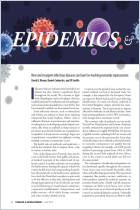Зарегистрируйтесь на getAbstract, чтобы получить доступ к этому краткому изложению.

Зарегистрируйтесь на getAbstract, чтобы получить доступ к этому краткому изложению.
Jonathan Quick
Are We Prepared for the Looming Epidemic Threat?
A dangerous virus, as yet unknown, has the potential to wipe out millions of us. Yet public health bodies are mired in complacency.
The Guardian, 2018
Что внутри?
The next epidemic may be a cough away and could spread faster than Ebola.
Recommendation
If you’re not losing sleep over the next pandemic, you likely haven’t heard of Harvard Medical School public health professor Jonathan Quick. In his compelling editorial, Quick details ways in which a swift-moving virus could kill millions of us in less than a year. The scenarios he paints are horrific, but Quick also provides sensible solutions to prevention, which could save millions of lives and billions of dollars. He cites the way the global AIDS/HIV prevention and treatment efforts slowed the progress of the disease and provides a roadmap for dealing with the next big public health threat.
Summary
About the Author
Jonathan Quick is chair of the Global Health Council, author of The End of Epidemics, and professor at the Harvard Medical School.


















Comment on this summary